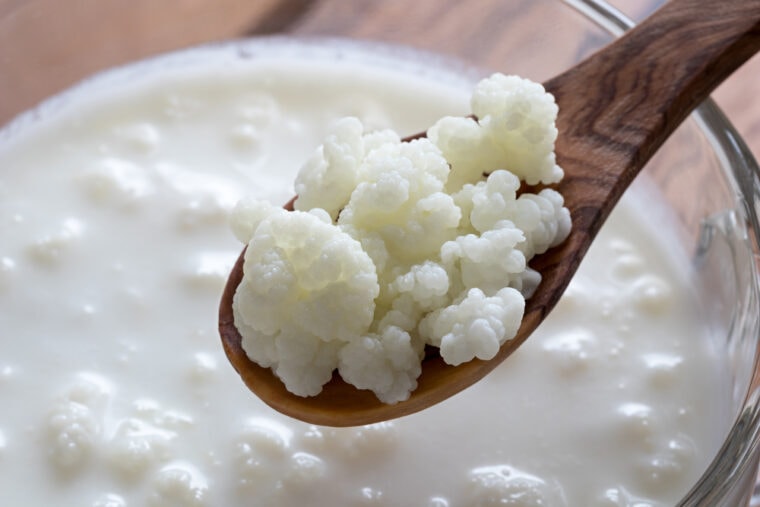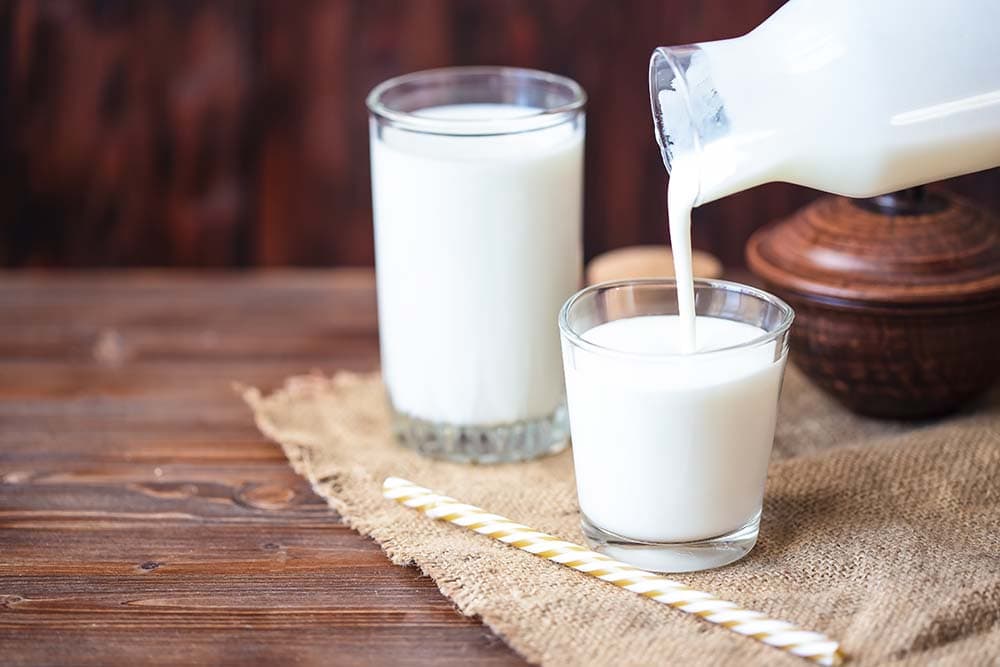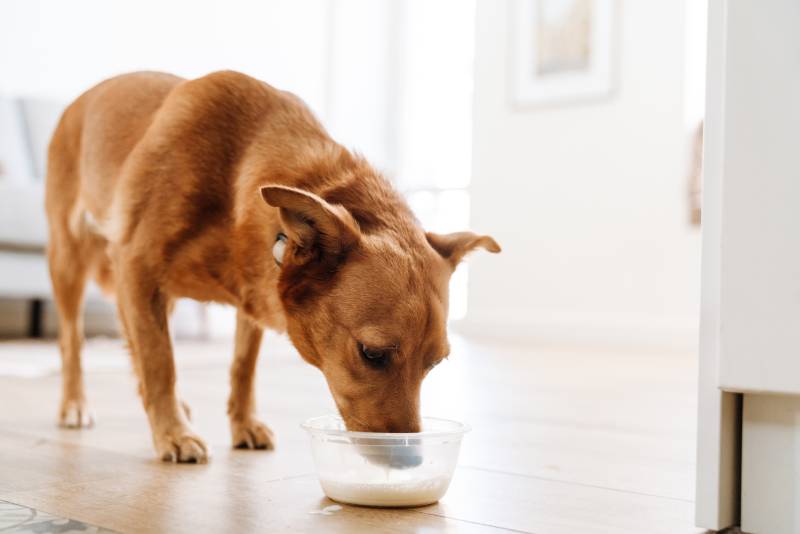
Click to Skip Ahead
Less popular than yogurt, but potentially healthier, kefir is a fermented milk drink that’s packed with probiotics, protein, and calcium. It generally contains much less sugar than milk or yogurt due to the fermentation process, which makes it better for your dog. Unless your dog is allergic to milk or suffers from extreme lactose intolerance, kefir should be safe to give them in moderation. Furthermore, kefir has been known to help alleviate digestive upset, allergies, and reduce their risk of osteoporosis and cancer in humans. That’s a powerful snack! And while little is known if these benefits crossover into the dog world, the important part to note is that kefir isn’t toxic to dogs and may offer these additional benefits.
What Is Kefir?
Kefir is a type of grain that consists of yeasts and lactic acid bacteria that are clustered together in a shape resembling a broccoli crown. When kefir is added to milk, it begins a fermentation process. This process breaks down the lactose and other sugars and adds probiotics. What a win-win!
Many pups are lactose intolerant. However, since dairy kefir contains low levels of lactose, it isn’t likely to bother your dog unless they’re super sensitive to lactose or allergic to milk. Goat’s milk kefir contains even less lactose. There are types of goat’s milk kefir manufactured specifically for dogs if you’d like to stay on the safe side.
Vegan kefir made with water or a plant-based milk, such as coconut, is completely lactose-free. However, it isn’t as nutritionally rich as kefir made with dairy or goat’s milk. It may contain additives that aren’t safe for dogs, such as sweeteners and certain emulsifiers.

Is Kefir Healthy for Dogs?
Your dog’s basic nutritional requirements should already be met if they’re eating a well-balanced diet and an AAFCO-certified food. However, supplementary nutrition can certainly help, especially if your pup suffers from chronic inflammation, allergies, or digestive issues. As long as your dog can safely process lactose, kefir may be an excellent addition to your dog’s diet. Be sure to talk to your veterinarian before giving your dog kefir to ensure they can consume it in a healthy way.
The probiotics in kefir can improve their overall health, and the food also supplies them with essential nutrients like calcium and protein. Calcium can aid in bone and muscle health. Protein is important for strong, healthy muscles and it helps to fuel your pup’s day, which can help them become more active and feel better overall.
A Word About Sugar
Kefir also has an advantage over yogurt because it usually contains a lower amount of sugar and calories. This is good news because sugar and an excessive caloric intake can lead to obesity in dogs. Dogs that are overweight tend to develop more joint issues and other chronic diseases including diabetes that can decrease a dog’s life expectancy.
Excessive sugar should be avoided entirely since it has no known health benefits in dogs and can put them at unnecessary risk of obesity. Fortunately, plain kefir only has between 8–12 grams of naturally-occurring sugar per cup, which is a much bigger portion than the recommended amount of 1-4 teaspoons per day that you may give your dog anyway. All this is to say that kefir is beneficial, but only in moderation.
Always scan the ingredients label when you’re buying kefir, or any other human food, for your dog to make sure that there aren’t any extra ingredients in the formula, such as added sugar or artificial sweeteners like xylitol, which can be deadly. As long as your dog can process lactose, plain goat or dairy kefir is a better option than plant-based kefirs because it’s less likely to contain harmful ingredients than flavored or vegan formulas.

The Pros of Probiotics for Dogs
A dog’s gut contains a complex balance of good and bad microorganisms. The good bacteria are there to aid in healthy digestion, immunity, and to prevent infections from the bad bacteria. When this balance is thrown off, your dog may experience digestive upset, inflammation, and immune-related problems. While your dog’s body can synthesize beneficial bacteria, sometimes they can use a little assistance. Probiotics and prebiotic fibers essentially replenish and feed the good bacteria, which helps them to prosper and keep your dog healthy.
Probiotics are good microorganisms that can boost your dog’s immune system, reduce inflammation, and support their gut health. Because of the decreased inflammation, probiotics may even lead to a reduced risk of cancer and other diseases catalyzed by inflammation.
Prebiotic fibers feed the probiotics that are already naturally occurring in your dog’s body.The chicory plant is a well-known prebiotic fiber that’s safe for dogs to eat.
Due to the fermentation process, kefir is high in active probiotics. However, it usually doesn’t contain prebiotics unless it contains chicory, which is a relatively common ingredient in yogurt.
While more scientific studies need to be conducted to be sure, the research that does exist, coupled with anecdotal tales, seems to suggest that probiotics and prebiotics are excellent dietary supplements for dogs and humans alike.

A Word of Caution
In dogs that have a severe imbalance in their gut flora, kefir may initially lead to loose stools. This should clear up within a few days as your dog’s body gets used to the probiotics and their gut microorganisms get more balanced. If your dog experiences loose stools after introducing kefir or other probiotics, we recommend reaching out to their vet for advice or waiting a few days to see if their condition improves.
Conclusion
Plain kefir can help fortify your dog’s health by supplying them with probiotics, protein, and calcium. Make sure that you buy plain goat or dairy kefir that doesn’t have added sugar, flavoring, or sweeteners since these are bad for your dog. Most dogs can tolerate kefir moderately well after a brief detox period, even if they’re lactose intolerant. If your dog is allergic to milk, you can opt for a vegan option, such as water-based kefir, as long as it doesn’t contain any harmful added ingredients. However, dairy or goat kefir is always best if possible, to reap the maximum health benefits.
Featured Image Credit: Madeleine Steinbach, Shutterstock








